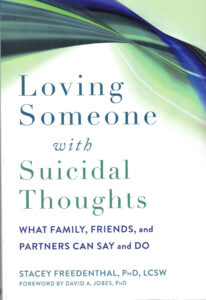Loving Someone with Suicidal Thoughts: What Family, Friends, and Partners Can Say and Do by Stacey Freedenthal, Ph.D, LCSW; Oakland, California: New Harbinger Publications; (c) 2023; ISBN 9781648-480249; 217 pages including resources and references; $19.95.

 SAN DIEGO — If someone you love says he or she is considering suicide, don’t try to argue against the idea. Jewish author Stacey Freedenthal suggests a more helpful response is to inquire why that person is thinking that way and then to listen without judgment. Can the problems that are prompting suicidal thoughts be solved, and if they were, would the person abandon suicidal thoughts? As many people who consider suicide are ambivalent about the idea, ask what countervailing thoughts they might have on the subject. Draw them out, in other words; the very act of conversing on the subject may help them see more productive alternatives.
SAN DIEGO — If someone you love says he or she is considering suicide, don’t try to argue against the idea. Jewish author Stacey Freedenthal suggests a more helpful response is to inquire why that person is thinking that way and then to listen without judgment. Can the problems that are prompting suicidal thoughts be solved, and if they were, would the person abandon suicidal thoughts? As many people who consider suicide are ambivalent about the idea, ask what countervailing thoughts they might have on the subject. Draw them out, in other words; the very act of conversing on the subject may help them see more productive alternatives.
What’s wrong with arguing? What’s wrong with saying, “No you don’t really want to commit suicide” or “that would be a sin!” or any other reflexive response? The answer, in short, is that it may make the person with suicidal tendencies become defensive, clam up, never want to talk about it with you again, or possibly become committed to the idea to prove themselves right and you wrong. Obviously, that would make it very difficult for you to be helpful.
Freedenthal says that most people who have suicidal thoughts are not in immediate danger of attempting to kill themselves. Most are giving serious consideration to the idea but have not gotten to the point where they want to actuate their thoughts. They are still debating with themselves, and that’s when a supportive friend, family member or partner can help them navigate toward making a life-saving choice.
Some people, however, are in immediate crisis, and Freedenthal has suggestions about what to do in such situations. She also pays considerable attention to how someone in a relationship with a suicidal person can maintain his or her own mental health, given the constant stress of the situation.
As a clinician and a blogger on suicidal thoughts, Freedenthal has counseled many people and those close to them about how to maturely deal with such thoughts. The titles of her 12 chapters indicate the breadth of the issues that need to be considered: 1) Why Suicide; 2) Your Loved One’s Suicidality and You; 3) Managing Your Stress, Fear, and Guilt; 4) Asking Difficult Questions; 5) Brave Listening; 6) Getting Help; 7) Building Safety; 8) After a Suicide Attempt; 9) Coping with Conflict; 10) If You Feel Manipulated; 11) Fostering Hope; and 12) Recovery and Suicidal Thoughts.
Except for the fact that her agent told me that Freedenthal was a Jewish author, I might not ever have read this book. Suicide was not on my radar. Even if the issue of suicide never arises among my family members and close friends (and I hope it never will), her book was valuable to me for suggesting ways to help people in crises without trying to impose my own values on them.
*
Donald H. Harrison is editor emeritus of San Diego Jewish World. He may be contacted via donald.harrison@sdjewishworld.com
What an excellent review and resource! I have never heard of the book.
Thankfully we are no longer in that state. I will keep it in mind for others whom I might run into.
Actually we have an acquaintance who is this state and the husband is in denial.
I will forward your review to them and share it with my therapist.
I am on the Mental Health Commitee at my synagogue and will also share it with them.
Best,
Bonnie